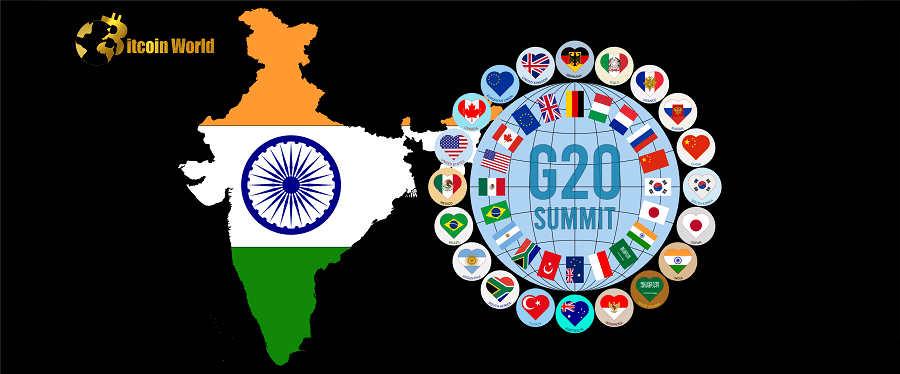The world of cryptocurrency is buzzing, and for good reason! India is stepping up onto the global stage, leading crucial discussions within the G20 to establish a Standard Operating Protocol (SoP) for crypto assets. Imagine a unified approach to crypto regulation across nations – that’s precisely what India is aiming for. Finance Minister Nirmala Sitharaman recently highlighted this vital initiative, sparking conversations and anticipation within the crypto community. Let’s dive into what this could mean for the future of crypto, both in India and worldwide.
Why is India Pushing for a Global Crypto SOP?
During a recent parliamentary session, Finance Minister Nirmala Sitharaman addressed the pressing need for comprehensive crypto asset regulation. She stated that India is actively engaging with G20 member nations to develop a Standard Operating Protocol. This isn’t just about India’s crypto policy; it’s about fostering a cohesive, global framework.
“In the G20, we’re raising it and having deep discussions with members so that a standard operating protocol arises, which leads in a cohesive, comprehensive approach where all countries work together to bring some regulation,” the Finance Minister explained.
This statement came in response to questions about India’s regulatory roadmap for Web3, signaling India’s proactive stance as it prepares to assume the G20 presidency from December 1, 2022.
The Challenge of Regulating a Borderless Asset
One of the core challenges with cryptocurrencies is their inherently global and decentralized nature. As Minister Sitharaman pointed out, “At the present, they [cryptocurrencies] are mostly uncontrolled in India.” This isn’t unique to India; many nations are grappling with how to effectively oversee these digital assets.
She further emphasized the technological backbone of crypto, stating, “technology drives all mining and crypto transactions.” This technological aspect makes it incredibly difficult for any single country to independently regulate or control cryptocurrencies effectively. Imagine trying to fence in the wind – that’s akin to a single nation attempting to regulate a globally dispersed technology.
Global Consensus: The Key to Effective Crypto Regulation?
Minister Sitharaman believes that international agreement is not just beneficial, but essential. She noted “there is a developing agreement, which is why this topic is being raised at the G20.” The goal is to ensure that a robust SoP emerges from these G20 discussions, paving the way for collaborative legislation across countries, covering everything from crypto mining to trading.
This sentiment echoes her previous statements. Last year, she stressed that any effective crypto regulation or prohibition necessitates broad international collaboration. This collaboration is crucial for:
- Analyzing Risks and Benefits: A unified global approach allows for a comprehensive assessment of the opportunities and potential dangers associated with cryptocurrencies.
- Adopting Common Taxonomy: Establishing shared definitions and classifications for crypto assets is vital for consistent regulation.
- Setting Global Standards: Harmonized standards ensure a level playing field and prevent regulatory arbitrage, where crypto businesses might seek out jurisdictions with lax rules.
India’s Consistent Voice on Crypto
The Finance Minister’s recent statements are consistent with the Indian government’s evolving stance on crypto. Here’s a quick recap of key points from other ministers:
- Technology Focus: Earlier in February, Minister Sitharaman highlighted that Bitcoin is “99% technology,” underscoring the importance of understanding the tech behind crypto for effective regulation.
- International Framework: Minister of State for Finance, Pankaj Chaudhary, has also confirmed the government’s collaboration with G20 nations to develop an international regulatory framework for crypto assets.
- Legal Crypto Trading in India (with Conditions): Minister of State for Electronics and Information Technology, Rajeev Chandrasekhar, clarified that crypto trading is legal in India, provided all existing standards and regulations are diligently followed.
Web3 and India’s Economic Potential
Beyond regulation, there’s immense excitement about the potential of Web3 technologies in India. Web3, the decentralized internet built on blockchain, is seen as a game-changer. According to estimates from Moneycontrol, Web3 companies could contribute a staggering $1.1 trillion to India’s GDP by 2032!
To fully capitalize on this potential, a national Web3 strategy is crucial. This strategy would not only address regulatory aspects but also focus on:
- Innovation and Growth: Creating an environment that fosters innovation and growth in the Web3 space.
- Job Creation: Unlocking new job opportunities in emerging tech sectors.
- Economic Empowerment: Leveraging Web3 to empower individuals and businesses.
Looking Ahead: A Collaborative Crypto Future?
India’s proactive role in the G20 discussions signals a significant step towards a more globally coordinated approach to crypto regulation. While the path ahead may have complexities, the commitment to establishing a Standard Operating Protocol is a positive sign for the crypto industry. International collaboration is not just a buzzword; it’s becoming increasingly vital for navigating the challenges and harnessing the opportunities presented by cryptocurrencies and Web3.
As India takes on the G20 presidency, the world will be watching closely. Will this lead to a unified global crypto regulatory landscape? The discussions are underway, and the potential impact on the future of digital assets is immense. One thing is clear: India is playing a pivotal role in shaping this future.
Disclaimer: The information provided is not trading advice, Bitcoinworld.co.in holds no liability for any investments made based on the information provided on this page. We strongly recommend independent research and/or consultation with a qualified professional before making any investment decisions.




